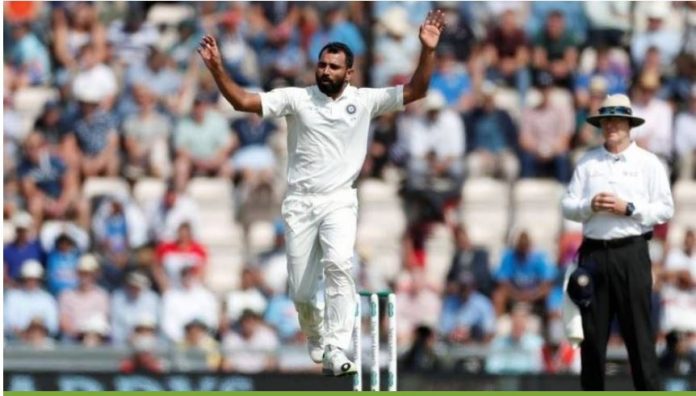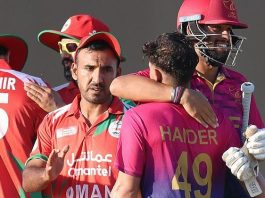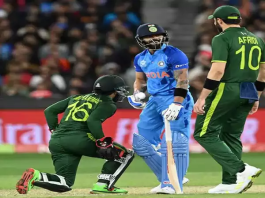Indian pacer Mohammed Shami believes the current fast bowling unit is the best in the history of the country’s Test cricket.
The right-arm fast bowler has told former India wicketkeeper-batsman Deep Dasgupta on ESPNcricinfo‘s Hindi chat show, Cricketbaazi, that no one can deny the fact that India now posses five top class pace bowlers.
“You and everyone else in the world will agree to this – that no team has ever had five fast bowlers together as a package. Not just now; in the history of cricket, this might be the best fast-bowling unit in the world,” Shami told Deep on the show.
Also Read: Irrfan Khan’s Son Babil, Often Told “You Look Just Like Your Dad,” Shared A Pic. See Inside
Apart from Shami, India’s core Test-match fast-bowling group also includes Ishant Sharma, Jasprit Bumrah, Umesh Yadav and Bhuvneshwar Kumar.
Commenting on who bowls with the new ball, Shami says it’s often a difficult choice, especially when the first-choice trio of himself, Ishant and Bumrah play together.
“We surround Virat Kohli and ask him to make the decision,” Shami said. “But he normally says, ‘don’t get me involved in all this; you decide among yourselves, I don’t have an issue.’
“That is the kind of fun we have in our team meetings. I let the other two start. I have no objection to bowling with a semi-new ball.”
Since recovering from a career-threatening knee injury, Shami has featured in 27 out of India’s 30 Tests since July 2017.
There have been a number of highlights — a match-winning second-innings five-for in Johannesburg in 2018, 16 wickets at 26.18 during India’s maiden Test series win in Australia in 2018-19, and 36 wickets at 18.63 in the ongoing 2019-21 World Test Championship.
Shami has had a tendency to take wickets in bursts — he attributes this to how he approaches bowling in different situations.
“If the batsman is set and we haven’t been able to take a lot of wickets, we try to bowl a tight line and length by dropping our pace,” he says.
“As soon as we get a wicket, you increase your pace by about 8kph. This difference in speed is pretty visible. If the bowler is bowling at around 140kph earlier, after picking up a wicket he gets his rhythm back, picks up the pace and the same ball is now delivered at 145kph.
“My mindset while bowling is that if the batsman is playing well, bowl a tight line and length, dry up the runs, and he will surely make a mistake. Once the set batsman is dismissed, I go for the kill as a bowler. That’s why it seems like I bowl in two different ways”.
He says “the ‘second-innings Shami’ label has been created by media.
That label has a lot to do with Shami’s contrasting records in the first — 92 wickets at 32.50 — and second — 88 wickets at 21.98 — innings of Test matches.
On the 2017-18 tour of South Africa, for example, 12 of his 15 wickets came in the second innings.
“I’m not sure, it just happens,” Shami said, when asked about this.
“I use the game very smartly in the second innings. Like in the recent match we played in Vizag [Visakhapatnam Test against South Africa] where I got a five-for, the pitch was pretty dead and wasn’t offering any bounce.
“It wasn’t turning that much either for our spinners to run through the opposition. But once in a while the ball was staying low. Batsmen find it tough to play when there is uneven bounce, so you need to bowl within the stumps. It is important to understand how the pitch is behaving.
“Now that we have played enough cricket in various conditions, we are experienced enough to gauge the conditions. You need to use the available conditions smartly. I am usually pumped up in the second innings when everyone else is tired.
“Everyone has spent three days on the field. Diesel engines take time to pick up compared to petrol ones. I wait patiently for everyone to tire out. You have five days in a Test match. Once everyone is tired, I step up.”
Commenting on Virat (Kohli) and MSD (Dhoni)’s captaincy style, Shami says, “They both have different styles. One says be cool, the other says be aggressive. Mahi Bhai (Dhoni) being a keeper can read everyone from behind the stumps.
“So he would very calmly communicate what is to be done and what is not to be bowled to a batsman. Virat is a bit different. He is a busy man, he likes aggression. He says attack and play hard, don’t bother about the result. Just give your best.”
On banning use of saliva, Shami says, “Using saliva is a habit now. Replacing it with an external substance like wax or Vaseline is going to be difficult. We’ll need to assess how well the external substance works and will need at least a month to get used to it. Otherwise it’s a guaranteed fine on us bowlers.”
Th use of pink ball is being widely spoken about.
“All balls are different and behave according to pitch conditions. With pink ball we will need grassy wicket. Also, the earlier advantage of bowlers leveraging moisture in the morning will probably get replaced by benefit to bowlers towards the end of the session,” he says.
“So according to me just reverse the order mentally and things will be fine. And if there is some meat in the pitch, it’ll be great for bowlers.”
Although Shami loves all formats of the game, he feels his Test debut was special. “I personally like Test cricket more than the ODIs, so definitely my Test debut was special. Another reason for it could be that Paaji (Sachin Tendlkar) put his hands on my shoulder and spoke to me on my Test debut.”




